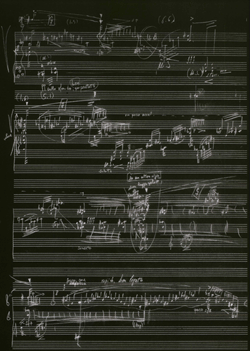TRACKING THE CREATIVE PROCESS IN MUSIC
(last updated : 2011-06-13)
"Tracking the Creative Process in Music" - International Conference
Organized by Nicolas Donin (IRCAM) and Vincent Tiffon (Univ. Lille-Nord de France)
Lille, 2011, September 29th – October 1st
Maison Européenne des Sciences de l’Homme et de la Société
Bilingual (French/English) Conference with simultaneous translation
What procedures, techniques, knowledge and/or know-how do musicians utilize when they ‘create’ music?
Beethoven’s famous walks in the park and the no less famous sketchbooks have, since the 19th century, popularized the idea that the creative activity of composers is the product not only of inspiration, but also of labor. Despite this representation of the creative process as work or discipline, relatively few studies of it were produced over the course of the twentieth century compared to the extensive scholarship during this time concerning the products of this process, that is, musical ‘works’ in the broad sense. As a branch of musicology, sketch studies has developed in the United States and Europe since the 1970s, but largely limited itself to the archival study of western art music. More recently, performance studies and popular music studies have led to a re-evaluation of the collective and collaborative dimensions of creative work, while musics that do not rely on notation (including electroacoustic music) present new problems of sources and analytical methods.
 With the epistemological paradigm shifts which musicology underwent at the end of the last century, in the wake of similar developments in the humanities and social sciences, the study of the ‘creative process’, far from being marginalized, was enriched. Not only did sketch studies extend their scope towards 20th century and pre-19th century composers, but the recent abundance of research into the processes of artistic creation confirms the impression of renewal currently underway in both the objects of study (interpretation and performance, improvisation, popular musics, sound engineering and computer-assisted design, etc.) and the methods employed (combining music analysis and social science, field work and experimental cognitive psychology, etc.). What new understandings of the creative process are emerging from the integration of new repertories, the elaboration of new analytical tools and through dialogue with other artistic media and scientific fields?
With the epistemological paradigm shifts which musicology underwent at the end of the last century, in the wake of similar developments in the humanities and social sciences, the study of the ‘creative process’, far from being marginalized, was enriched. Not only did sketch studies extend their scope towards 20th century and pre-19th century composers, but the recent abundance of research into the processes of artistic creation confirms the impression of renewal currently underway in both the objects of study (interpretation and performance, improvisation, popular musics, sound engineering and computer-assisted design, etc.) and the methods employed (combining music analysis and social science, field work and experimental cognitive psychology, etc.). What new understandings of the creative process are emerging from the integration of new repertories, the elaboration of new analytical tools and through dialogue with other artistic media and scientific fields?
This conference will offer opportunities to assemble for the first time a considerable number of researchers directly or indirectly interested in the study of the creative processes involved in the (past and present) production of music/sound, and to take the first steps towards a comparative assessment of the different methodologies developed over the last thirty years in research areas which interact with each other all too rarely. The conference talks will present findings from the field of music as well as related artistic domains, to explore new methodologies and theoretical models. The conference will serve to open up broader issues of artistic creativity as it is approached in fields outside of musicology: history, psychology, cognitive science, sociology, anthropology, genetic criticism, etc.











